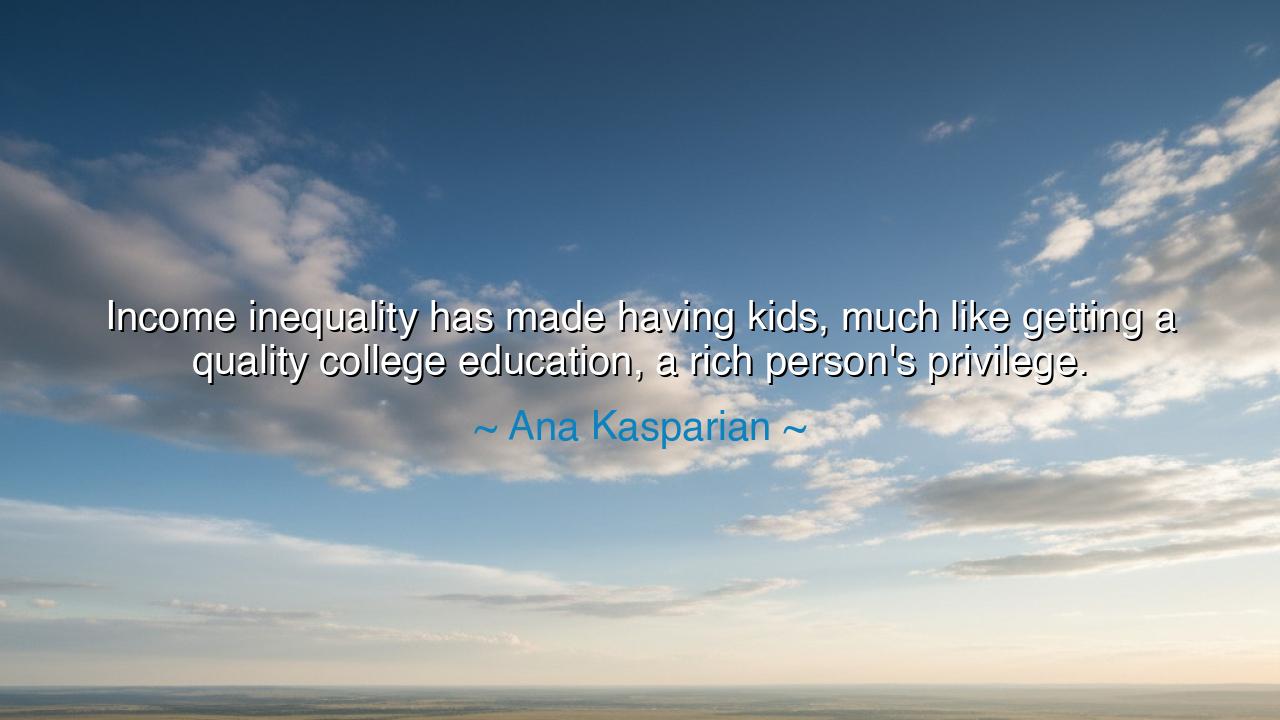
Income inequality has made having kids, much like getting a
Income inequality has made having kids, much like getting a quality college education, a rich person's privilege.






Ana Kasparian, with the voice of one who has seen the hardships of the common people, once declared: “Income inequality has made having kids, much like getting a quality college education, a rich person’s privilege.” In this lament there is sorrow, but also warning. For she speaks of a world where the most natural of human blessings—raising children, passing on life, and nurturing the young—has become chained by wealth, and where the sacred pursuit of education, once promised to all, is locked behind the golden gates of the powerful. Her words pierce us like a cry from the streets, reminding us that when inequality grows unchecked, even the most basic rights of humanity are stripped away.
The origin of this quote lies in the growing reality of modern societies where the cost of living rises faster than wages, where the price of raising kids—food, housing, healthcare, schooling—has become unbearable for many. Kasparian, as a journalist and commentator, has long observed how economic structures favor the few while burdening the many. She points out that what should be universal—family, education, dignity—has been transformed into luxuries, accessible mainly to those born into wealth. Her words stand as a judgment against systems that preach freedom yet deny it in practice to those without resources.
History itself shows us the truth of her lament. In the feudal ages of Europe, only the lords and nobles could afford many children, for peasants, crushed by hunger and disease, often buried as many as they birthed. Likewise, only the wealthy could afford to send their sons to universities, while the poor labored in fields generation after generation. What Kasparian observes today is but an echo of those darker times, a reminder that without vigilance, societies regress, and the gulf between rich and poor widens until human flourishing itself becomes the treasure of the few.
Consider also the example of the United States in the mid-twentieth century. After World War II, the G.I. Bill opened the doors of college education to millions of working-class families. Children were born into households that had hope, stability, and upward mobility. But in the decades since, as income inequality has risen, the cost of college education has soared, debts have shackled the young, and the dream of both raising children and attaining higher learning has again become difficult for those without wealth. Kasparian’s words echo in this decline: what was once a right has become a privilege.
The deeper meaning of her teaching is that societies cannot endure when the blessings of life are distributed only to the elite. A nation where only the wealthy can afford to raise children will wither in spirit, for it betrays its own future. A world where only the privileged can be educated will rot in corruption, for it denies wisdom to the many and hoards it for the few. In both cases, inequality is not merely economic—it is moral. It is the theft of hope, the slow suffocation of possibility, the betrayal of generations yet unborn.
The lesson for us is urgent: we must see kids and education not as privileges but as rights that belong to all people. To raise children in safety, to educate them in dignity—these are the foundations of civilization itself. When denied to the many, they destabilize nations and sow unrest. We must remember that history’s greatest societies flourished when they invested in the children of farmers as much as the children of kings, when they opened schools not just for the privileged, but for all.
Practical action lies before us. As citizens, we must demand policies that reduce income inequality, that make childcare affordable, healthcare accessible, and college education attainable without crushing debt. As communities, we must support families struggling to raise children, and create opportunities for the young regardless of wealth. And as individuals, we must resist the temptation to believe that privilege is natural or deserved; instead, we must recognize that it is a structure built by human choices, and therefore changeable by human will.
Thus, Ana Kasparian’s words resound like a warning trumpet in our age: when kids and education become luxuries, society itself is in peril. Let us then awaken, resist the march of inequality, and labor for a world where every child may be born in dignity, every student may learn in freedom, and the blessings of life are shared, not hoarded. For only then can we say that humanity has chosen justice over privilege, and life over decay.






AAdministratorAdministrator
Welcome, honored guests. Please leave a comment, we will respond soon